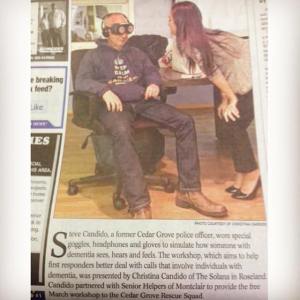I’m actually embarrassed at how long it’s been since I’ve posted, especially about my loves. In my defense, in the past five weeks, I’ve left one job, started another, traveled to Europe two separate times, and flown domestically twice. On top of that, I’ve offered a workshop to train first responders on how to effectively respond to calls that involve dementia patients (newspaper article pictured below!). To say it’s been a crazy month is an understatement.
This afternoon, I attended a networking event for colleagues in the eldercare field. One conversation stuck with me most, as it touched upon something that’s been on my mind for quite some time – probably since I returned home from my first volunteer trip to Italy in 2012! A gentleman I chatted with shared his ideas and hopes to change the face of in-home care. He is striving to recruit caregivers of a higher “quality” or skill level, and to compensate them accordingly. To give you some insight (though it’s no secret): caregivers are often foreigners who have obtained either (or both) a certified nursing assistant (CNA) or certified home health aide (CHHA) license. Their pay varies, but in general it pales in comparison to the work they actually do. I swear to you, they’re superhuman. They should all be canonized as saints.
Obviously, I’m all for better training and higher wages – no one is more deserving. However, I couldn’t help but feel sad for this man as he so passionately shared his dreams with me. The issue doesn’t lie within our pool of caregivers themselves. Are some more qualified and compassionate than others? Of course, as is the case in any profession. But it’s not them; it’s us. We’re the ones who need the face-lift. Our culture needs the education, and our mindsets a makeover.
In other countries, senior citizens are worshiped. Their wisdom is celebrated and their knowledge embraced. The terms “grandma” and “old man” are endearing, not degrading, and seniors are the heads of families whose guidance is sought out. I can vouch that Italians in particular adore their elders. To care for them is a privilege – a service that is rewarding in every sense of the word.
Here? We dread growing old and conceal any signs. We talk TO nonnas like children and ABOUT them in their presence, blatantly as though they can’t understand. When one’s health and cognition decline, they’re an issue that must be dealt with. They’re a family meeting whose fate is argued amongst siblings. They are time consuming and aggravating, their condition an embarrassment. Dignity and patience are neither preserved nor expected. This is our norm, and it is absolutely heartbreaking; no wonder we seek immigrants to care for our seniors.
I’m an American, so I’m not pointing fingers; everyone’s guilty and we’re all at fault. These outlooks are learned and these behaviors are modeled. I beg you, per favore, let’s end them here. Let’s challenge the norm and remodel our mentality. At the risk of sounding cliché, let’s be the change we wish to see in the world. Believe me, you’ll beg for that change when you’re in their shoes.
